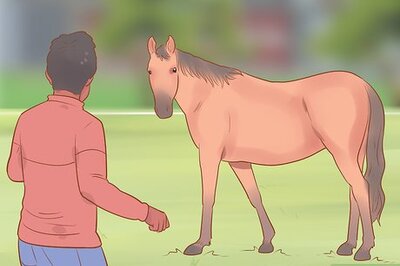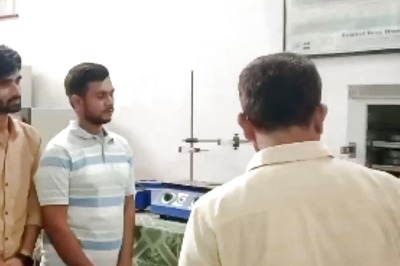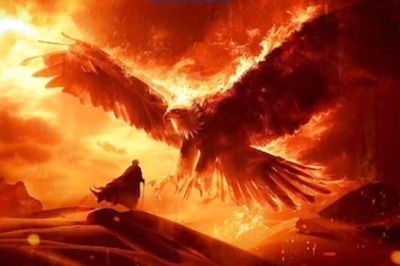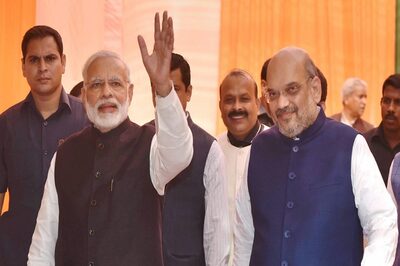
views
New Delhi: Lieutenant General Jacob Farj Rafael Jacob or just General JFR Jacob who breathed his last at the age of 93 on Wednesday was a very colourful character. Known as the hero of the 1971 Bangladesh liberation war, General Jacob later went on serve as a Governor for many years. A Bagdhadi Jew, born in Calcutta (now Kolkata) in 1923, Jacob was known for his plain speaking. His critics used to call him a boastful character. His admirers held him in high esteem. It was General Jacob.
His ancestors migrated to Calcutta in the middle of 18th century and made India their new home. He was born in a deeply religious Jewish family. Even in Israel, he was known as a Jewish war hero. General Jacob was the last vestige of a dying Jewish community in India. Currently the total population of the Jews is less than 5000 in India.
General Jacob was a voracious reader, prolific writer and a public speaker. He was a part of several institutions and organisations. His home in New Delhi was a pilgrimage site for Jewish community members from all over the World. General Jacob was very proud of his participation in the 1971 Bangladesh liberation war which created an independent nation of Bangladesh. During the war he was Chief of Staff, Eastern Command working directly under Lieutenant General Jagjit Singh Aurora or JS Aurora. Jacob was appointed as Chief of Staff, Eastern Command by the then General Sam Manekshaw who later became a Field Marshal. Under the Command of General Aurora, the three Corps of the Indian Army entered Dhaka and forced Pakistani Army to surrender on December 16, 1971. Over 90,000 Pakistani soldiers surrendered to India in that historic war declared by the then Prime Minister Indira Gandhi. His claims were contested by some others who served with him in the Army. He was both admired and criticised in equal measures. General Jacob, who had serious differences with the Congress party joined the BJP in mid 1990s. After that he wrote a book titled “Surrender at Dacca : Birth of a Nation".
Speaking to Rediff.Com a few years ago Jacob had said “though no war goes completely according to plan, this one went off reasonably well, and on December 13, we were outside Dhaka.
The advance from the north went off well, and though the move of the two brigades was delayed the paradrop took place as planned. By December 13, we had about 3,000 troops outside Dhaka.
Meanwhile the American fleet was moving into the Straits of Malacca. Some in Delhi were panicking. The radio signals we were intercepting from Islamabad to the Pakistani forces in the east said "Fight on, you are getting help from yellow (China) from the north, and white (America) from the south."
According to that interview to Rediff, On December 13, there was an American resolution at the United Nations, which was vetoed by the Soviet Union. The Soviets said no more vetos. (Then Chief of the Army Staff S H F J) Manekshaw reacted and sent us an order to capture "all the towns in Bangladesh except Dacca." Listing every single one that we had bypassed.
Talking about that an exited Jacob had said “Not only that, he copied the order down to the three corps. So we rang the corps to tell them to ignore these orders.
(Lieutenant General Jagjit Singh) Aurora (then General Officer Commanding Eastern Command) came agitated into my room, showing me the signal and saying this was was all my fault because he wanted to capture the towns, and I did not support this view. Further, I had opposed operations to capture Sylhet, Rangpur and Dinajpur and other towns in East Pakistan. So I got hold of Niazi on the wireless that night and explained that our forces outside Dhaka were very strong, a Mukti Bahini uprising was imminent, ethnic minorities would be protected and that they ( the Pakistan army) would be treated with dignity if they surrendered.
On December 14, I got an intercept that there was a meeting at the Government House in Dhaka. There were two government houses in Dhaka, so we took an educated guess, and fortunately it was the correct one. The Indian Air Force bombed it within two hours. The governor of East Pakistan resigned. About 4 pm that afternoon, Niazi and Major General Farman Ali went to see Spivack, the American consul general, with the following proposals:
I got to know about it through one of the embassies. So I informed Manekshaw, who spoke to the American ambassador in India, who didn't know anything about it. That same day, the American embassy in Islamabad sent it to New York, and it was given on December 15 to (then Pakistan foreign minister) Zulfiqar Ali Bhutto. He refused to accept it. The Americans then gave it to us. On December 15, the ceasefire was ordered. A resolution by Poland, part of the Soviet bloc, was introduced at the UN on December 15 evening in New York, which was the morning of December 16 our time. Bhutto tore it up in rage, because it did not condemn India as an aggressor. On the morning of December 16, Manekshaw phoned me and said: "Go and get a surrender."
"On what terms?" I asked. "I have already send you a draft surrender document. Do I negotiate on that?"
"You know what to do, just go!" he replied.
A Pakistani brigadier met me at the airfield to guide me to Niazi. A long argument took place with the Mukti Bahini, until I said, "Look, your new government is coming in tomorrow, and Niazi wants to surrender, for God's sake let us go!" Finally they let us go. I arrived at Niazi's headquarters, where I had the draft surrender document read out to him.
This is an unconditional surrender, he said. "You have only come here to discuss the ceasefire and the withdrawal of the Pakistani army."
"General," I replied, "this is not unconditional, I have worked on this for some time. I had put in it that we would protect ethnic minorities, that we would ensure the safety of them and their families, that they would be treated with dignity as officers and men according to the Geneva Convention. So it is not unconditional. Where would you find all these conditions laid down?"
But he said no.
I had thought he had 25,000 troops in Dhaka. He told me had 30,000.
I listened to the arguments for some time. His aides like Farman Ali were advising him not to surrender.
Finally, I told him, "Look general, you surrender, I will ensure your safety, the safety of your families, ethnic minorities, everyone. You will be treated with respect. If you don't I am afraid I can take no responsibility for what happens to you or your families. What is more, we will have no other option but to order the immediate resumption of hostilities. I give you 30 minutes."
I walked out. I made my own modalities for the surrender.
This surrender is unique, the only public surrender in history where a ceasefire was converted into surrender and signed in four hours. Niazi had the capacity to fight on for two to three weeks, and the UN was in session".
Jacob’s above interview led to a furore. Many of critics attacked him for belittling the role of General Aurora and the others who also led the Indian Army in that war. But, General Jacob was unfazed.
Till his death he defended his role and always maintained that it was he who forced General Niazi to surrender. Under the NDA government led by the Prime Minister AB Vajpayee, he served as the Governor of Goa and Punjab.
His autobiography is aptly named “An Odyssey in War and Peace: An Autobiography Lt Gen. J.F.R. Jacob". He had personally presented a copy of his autobiography to the Prime Minister Narendra Modi in 2014.




















Comments
0 comment